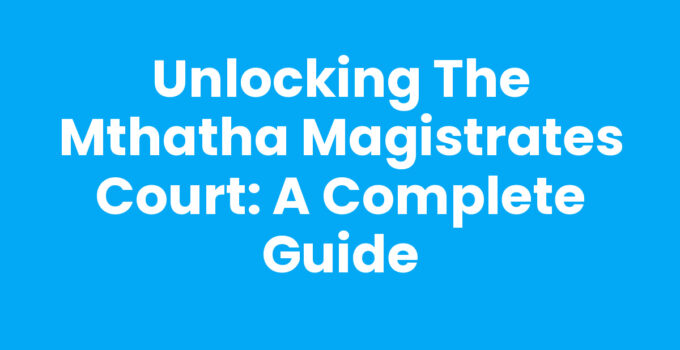The Mthatha Magistrates Court is a pivotal institution within the South African judicial system, primarily serving the Eastern Cape region. This court deals with various legal matters, from civil cases to criminal prosecutions, ensuring justice is accessible to all citizens. In this comprehensive guide, we will delve into the functions, services, and essential information about the Mthatha Magistrates Court that every citizen should know.
Mthatha Magistrates Court: Understanding Its Role and Services
The Mthatha Magistrates Court plays a crucial role in the legal landscape of Mthatha and surrounding areas. It provides an accessible platform for individuals to resolve disputes and seek justice. Common cases handled by this court include:
- Criminal Cases: These include minor offenses to more serious crimes, ensuring that individuals are tried fairly under the law.
- Civil Cases: This involves disputes between individuals or organizations, such as contractual disputes, property issues, and more.
- Family Law: The court handles matters related to divorce, child custody, and maintenance.
- Traffic Offences: It deals with cases involving traffic violations, ensuring public safety and adherence to the law.
As citizens of Mthatha and surrounding regions seek justice, knowing how to navigate the facilities and services of the Mthatha Magistrates Court becomes paramount. Here’s a step-by-step guide to accessing its services:
Step-by-Step Guide to Accessing Services at Mthatha Magistrates Court
Step 1: Determine the Type of Case
Understanding whether your issue is civil, criminal, or a family-related matter will dictate the procedure you need to follow.
Step 2: Gather Necessary Documentation
Ensure you have all records related to your case. This might include contracts, police reports, or previous court documents.
Step 3: Visit the Court
Locate the Mthatha Magistrates Court. It’s advisable to check operational hours beforehand, as well as whether you need to schedule an appointment.
Step 4: Speak to the Court’s Clerks
Once at the court, consult with clerical staff who can guide you through filing processes and direct you to the appropriate department.
Step 5: Understand Your Rights and Responsibilities
It’s crucial to familiarize yourself with your rights in court, as well as potential legal responsibilities you may have.
Step 6: Attend Hearings
On the scheduled date, attend your court hearings promptly. Ensure you adhere to court decorum and respect the proceedings.
Check This: Exploring Ngangelizwe Township Mthatha: Culture and Community
Additional Resources and Support at Mthatha Magistrates Court
The Mthatha Magistrates Court also offers several resources aimed at helping the public navigate legal processes effectively. These include:
- Legal Aid: For those who cannot afford legal representation, the court provides access to legal aid services.
- Community Outreach Programs: Regular workshops and seminars are conducted to educate the community about their legal rights.
- Family Mediation Services: For family law matters, mediation services are available to help parties reach amicable solutions outside of court.
Taking advantage of these resources can significantly ease the burden of legal processes and contribute positively to one’s experience at the Mthatha Magistrates Court.
Further Reading: Discover Stunning Houses For Sale In Mthatha Today!
Conclusion: Navigating Justice in Mthatha
The Mthatha Magistrates Court stands thus as a beacon of hope for many within the Eastern Cape. It provides critical access to justice, offering services that cater to various sectors of society. By understanding how to navigate this institution effectively, residents can empower themselves and others around them to make informed legal choices. Remember to stay informed about your rights and seek assistance when needed—justice is a collaborative effort.
Related Guide: Wsu Mthatha Graduation Dates: Your Guide to Key Information
Frequently Asked Questions
What types of cases does the Mthatha Magistrates Court handle?
The court handles criminal cases, civil disputes, family law matters, and traffic violations.
How can I access legal aid at the Mthatha Magistrates Court?
You can access legal aid services by visiting the court and speaking to clerical staff about your eligibility.
Are there community programs available related to legal education?
Yes, the court conducts regular workshops and outreach programs to educate the community about their legal rights.









